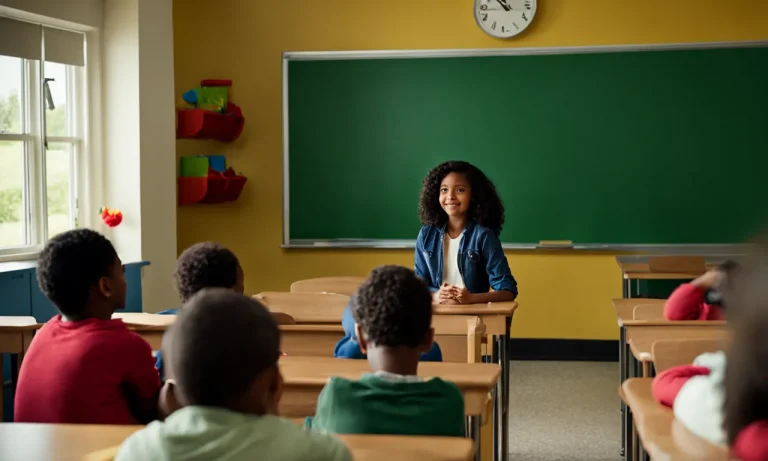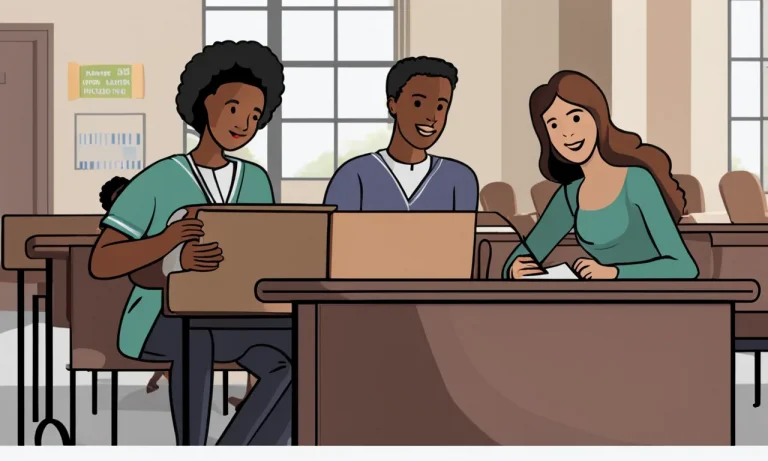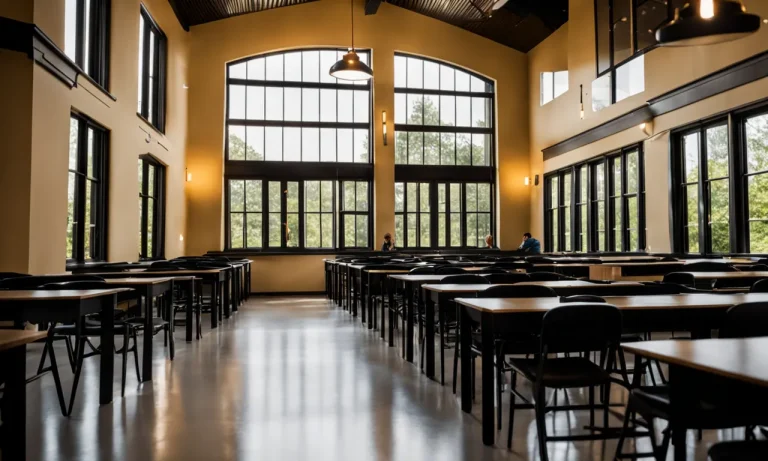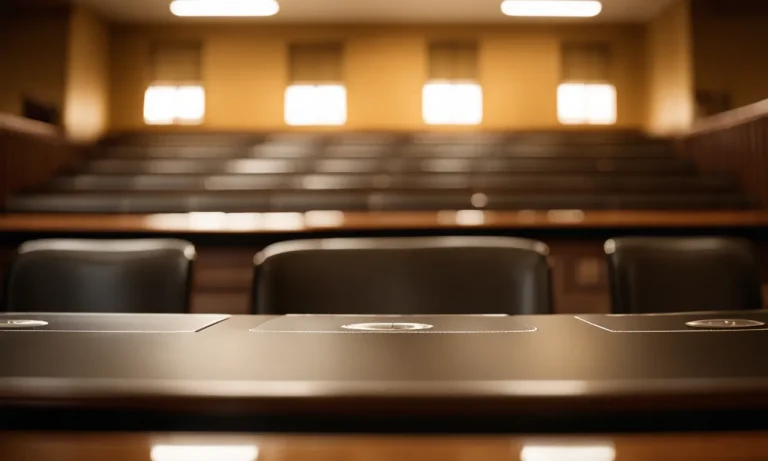Failing a class in high school can be stressful and concerning. As a student, you likely have many questions about how it will impact your academic record, graduation timeline, and future prospects.
If you’re short on time, here’s a quick answer to your question: Failing a class in high school typically means you’ll have to retake the course to earn the credit you need to graduate. It may require summer school, online classes, or repeating the class the next school year.
While one failed class won’t likely alter your transcript significantly, multiple failed courses could delay your expected graduation date.
In this comprehensive guide, we’ll explain everything you need to know about the implications of failing a high school course. We’ll cover how it impacts your GPA, graduation timeline, college applications, and strategies to get back on track after a failed class.
How Failing a Class Impacts Your GPA
Your GPA is Calculated Using Your Grades
Your GPA, or Grade Point Average, is a numerical representation of your academic performance. It is calculated by assigning a specific value to each letter grade you receive in your classes. Typically, an A is worth 4 points, a B is worth 3 points, a C is worth 2 points, a D is worth 1 point, and an F is worth 0 points.
These points are then weighted by the number of credit hours for each class, and your GPA is calculated by dividing the total number of grade points by the total number of credit hours.
For example, if you earn an A in a 3-credit hour class, you would receive 12 grade points (A = 4 points x 3 credit hours). Your GPA is an important factor that colleges and universities consider when evaluating your academic achievements.
View this post on Instagram
Failing Brings Down Your GPA
When you fail a class, it has a negative impact on your GPA. Since an F is worth 0 points, it significantly lowers your average grade point value. For example, if you have four classes in a semester and you receive A’s in three of them but fail one, your GPA will be affected by the F grade.
The more credit hours the failed class carries, the greater the impact on your GPA.
Additionally, failing a class can also affect your academic standing and eligibility for certain programs or scholarships. Some schools have minimum GPA requirements for participation in extracurricular activities or maintaining financial aid eligibility.
It is important to be aware of your school’s policies regarding academic probation and the consequences of failing a class.
Retaking a Class Can Improve Your GPA
If you fail a class, you may have the option to retake it. Retaking a class allows you to replace the previous grade with a new one, potentially improving your GPA. However, it’s important to note that different schools have different policies regarding grade replacement.
Some schools only allow the new grade to replace the failed grade in the GPA calculation, while others will average the two grades together. It’s essential to consult your school’s academic policies or speak with an academic advisor to understand how failing and retaking a class will impact your GPA.
Retaking a failed class can provide an opportunity to demonstrate improvement and mastery of the subject matter. It also shows resilience and determination to succeed academically. Taking advantage of this opportunity can have a positive impact on your overall academic record and future opportunities.
When You’ll Have to Retake a Failed Class
High school is a crucial time for students as they work towards earning their diploma. However, sometimes students may face challenges and find themselves failing a class. When this happens, it’s important to understand the consequences and the steps required to rectify the situation.
High Schools Require Earning Credits to Graduate
In most high schools, students are required to earn a certain number of credits in order to graduate. Each class successfully completed earns a specific number of credits towards graduation. When a student fails a class, they do not earn the credits associated with that course.
This can put their progress towards graduation at risk.
For example, if a student fails a math class worth 1 credit, they will need to retake the course and pass in order to earn that credit towards their graduation requirements. Failing a class can also affect a student’s GPA (Grade Point Average) negatively, which is another important aspect for college admissions.
Options for Retaking a Failed Class
When a student fails a class, they typically have a few options for retaking the course. One option is to retake the class during the regular school year. This may involve attending the class again with a different teacher or during a different period.
Another option is to take the class during the summer, either at their high school or through a summer school program.
Some schools also offer online classes or credit recovery programs, which allow students to retake failed classes at their own pace. These options provide flexibility and can be particularly beneficial for students who have scheduling conflicts or need additional support in certain subjects.
The Timing of Retaking a Failed Course
The timing of retaking a failed class can vary depending on the school’s policies and the availability of resources. In some cases, students may be able to retake the class during the next semester or academic year.
However, it’s important to note that failing a class can have consequences for a student’s overall academic progress and may require them to adjust their course schedule to accommodate the retake.
It’s crucial for students who fail a class to communicate with their guidance counselor or academic advisor to understand the specific procedures and timelines for retaking the course. These professionals can provide guidance and support in navigating the process and ensuring that students stay on track towards graduation.
Remember, failing a class is not the end of the world. It’s an opportunity to learn from mistakes, seek additional help, and grow academically. With the right support and determination, students can overcome this setback and continue their educational journey successfully.
View this post on Instagram
Effects on Your Graduation Timeline
Failing a class in high school can have various consequences, one of which is its impact on your graduation timeline. Earning enough credits is crucial for graduating on time, and failing a class can disrupt this process.
Graduation Depends on Earning Credits
In order to graduate from high school, students are required to earn a certain number of credits. Each class successfully completed adds to your credit count, bringing you closer to graduation. However, failing a class means that you do not earn the credits associated with that course.
As a result, you may find yourself falling behind in meeting the credit requirements for graduation.
Students who fail a class are more likely to take longer to graduate compared to their peers who pass all their classes. This delay can have a ripple effect on your future plans, such as college admissions or entering the workforce.
Failing Core Classes Delay Graduation More
While failing any class can impact your graduation timeline, failing core classes can have an even greater effect. Core classes are typically required courses in subjects like English, math, science, and social studies.
These classes often form the foundation of your high school education and are essential for meeting graduation requirements.
If you fail a core class, you may be required to retake it in order to earn the necessary credits. This can significantly delay your progress towards graduation, as you may need to rearrange your schedule to accommodate the retake.
Additionally, retaking a core class might limit the number of elective classes you can take, further prolonging your graduation timeline.
Summer School Helps Catch Up
One option to mitigate the effects of failing a class on your graduation timeline is to enroll in summer school. Summer school provides an opportunity to make up for failed credits and get back on track. By taking summer classes, you can earn the necessary credits and still graduate on time.
It’s important to note that summer school may not be available for all subjects or at all schools. Additionally, attending summer school might require additional time and effort on your part. However, it can be a valuable option for students who want to minimize the impact of failing a class on their graduation timeline.
For more information on summer school options and availability in your area, you can visit the website of your local school district or contact your school counselor.
How Failing a Class Impacts College Applications
When it comes to college applications, your academic record is one of the most important factors that colleges consider. Failing a class in high school can have a significant impact on your college applications and future opportunities. Here are some key points to consider:
Colleges Look at Your Whole Academic Record
Colleges take a holistic approach when evaluating applications, which means they consider more than just your GPA. They review your entire academic record, including your grades, course selection, and any trends or improvements over time.
While failing a single class may not automatically disqualify you from admission, it is important to understand that colleges will take notice.
According to an article on US News and World Report, colleges want to see that you have challenged yourself academically and have shown growth and improvement throughout high school. A failing grade raises concerns about your ability to handle college-level coursework and may raise questions about your commitment and work ethic.
One F can Be Overcome with Other Good Grades
While failing a class is certainly not ideal, it is possible to mitigate the impact if you have strong grades in other subjects. Colleges understand that students may struggle in specific areas but excel in others.
If you have consistently performed well in other classes and have a strong overall GPA, it can help offset the impact of a failing grade.
According to College Board, colleges are more likely to focus on your overall performance rather than a single failing grade. They want to see that you are capable of handling challenging coursework and can recover from setbacks.
It is important to demonstrate your ability to bounce back and show improvement in subsequent semesters or years.
Multiple Fs Raise Concerns
While colleges may be more forgiving of a single failing grade, having multiple failing grades raises serious concerns. It indicates a pattern of academic struggle and may suggest a lack of effort or commitment.
Admissions officers may question your ability to handle the rigors of college coursework if you have consistently failed multiple classes.
Multiple failing grades can significantly decrease your chances of admission to selective colleges. They want to ensure that students they admit are prepared for the academic challenges they will face.
It is important to remember that while failing a class can have repercussions on your college applications, it is not the end of the world. Many colleges understand that students face challenges and setbacks, and they value resilience and the ability to learn from mistakes.
If you do find yourself failing a class, take it as an opportunity to reflect, learn, and improve. Seek extra help, develop effective study strategies, and demonstrate your determination to succeed. Your ability to overcome obstacles can be just as impressive to colleges as a perfect academic record.
View this post on Instagram
Strategies to Recover After Failing a Class
Meet with Your School Counselor
Failing a class in high school can be a stressful experience, but there are ways to recover and improve your academic performance. One of the first steps you should take is to meet with your school counselor.
They are there to provide guidance and support, and can help you create a plan to get back on track. Your counselor can assist you in understanding the requirements for graduation, exploring options for credit recovery, and discussing any additional resources that may be available to you.
Improve Your Study Habits
One of the most effective ways to recover from failing a class is to improve your study habits. Take a moment to reflect on your current study routine and identify areas for improvement. Are you setting aside enough time each day to study?
Are you utilizing effective study techniques, such as creating flashcards or summarizing key concepts?
Consider implementing a study schedule, breaking down your tasks into manageable chunks, and finding a quiet and distraction-free environment to study in.
By making these changes, you can maximize your learning and increase your chances of success.
Get Tutoring or Extra Help
If you’re struggling with a particular subject, seeking additional help can make a significant difference. Many schools offer tutoring services or have teachers available for extra support. Don’t hesitate to reach out and ask for assistance.
Tutoring can provide personalized attention and guidance, helping you grasp difficult concepts and improve your understanding of the material. Additionally, working with a tutor can help boost your confidence and motivation, making it easier to overcome the challenges you faced in the class you failed.
Remember, failing a class does not define your abilities or limit your potential. It’s an opportunity to learn from your mistakes, develop resilience, and grow academically. By meeting with your school counselor, improving your study habits, and seeking extra help, you can bounce back from a setback and thrive in your academic journey.
Conclusion
Failing a class in high school can put your graduation goals and college plans at risk. But with dedication and focus, you can get back on track. Meet with your counselor, teachers and parents to make a plan to retake the class and boost your grade.
With hard work, you can recover from a failed course.
The most important thing is not to get discouraged. Failing one class does not define you or your academic abilities. Learn from what went wrong and implement strategies to improve. You’ve got this! With commitment to your studies, you can achieve your high school diploma and continue pursuing your dreams.






